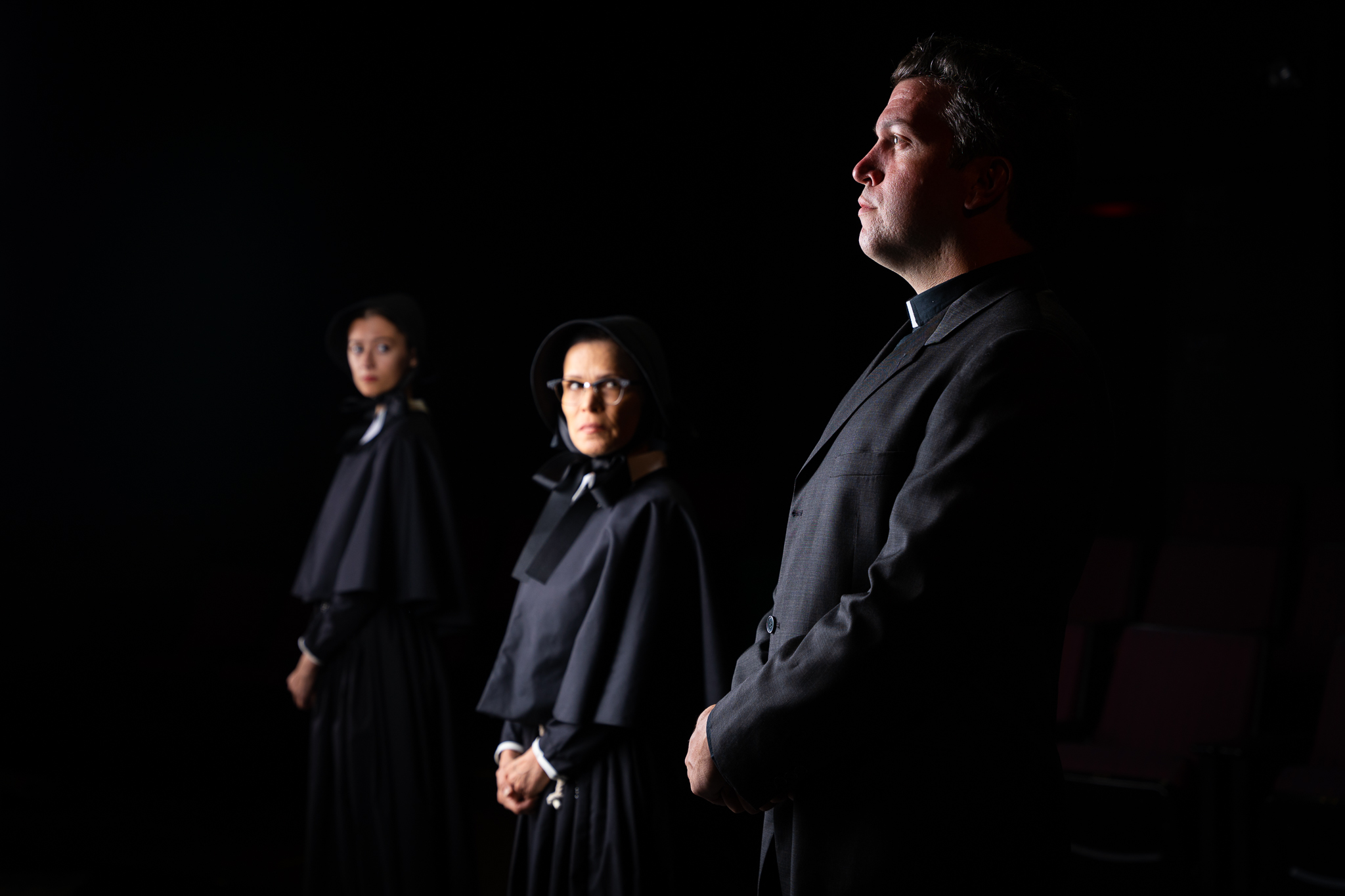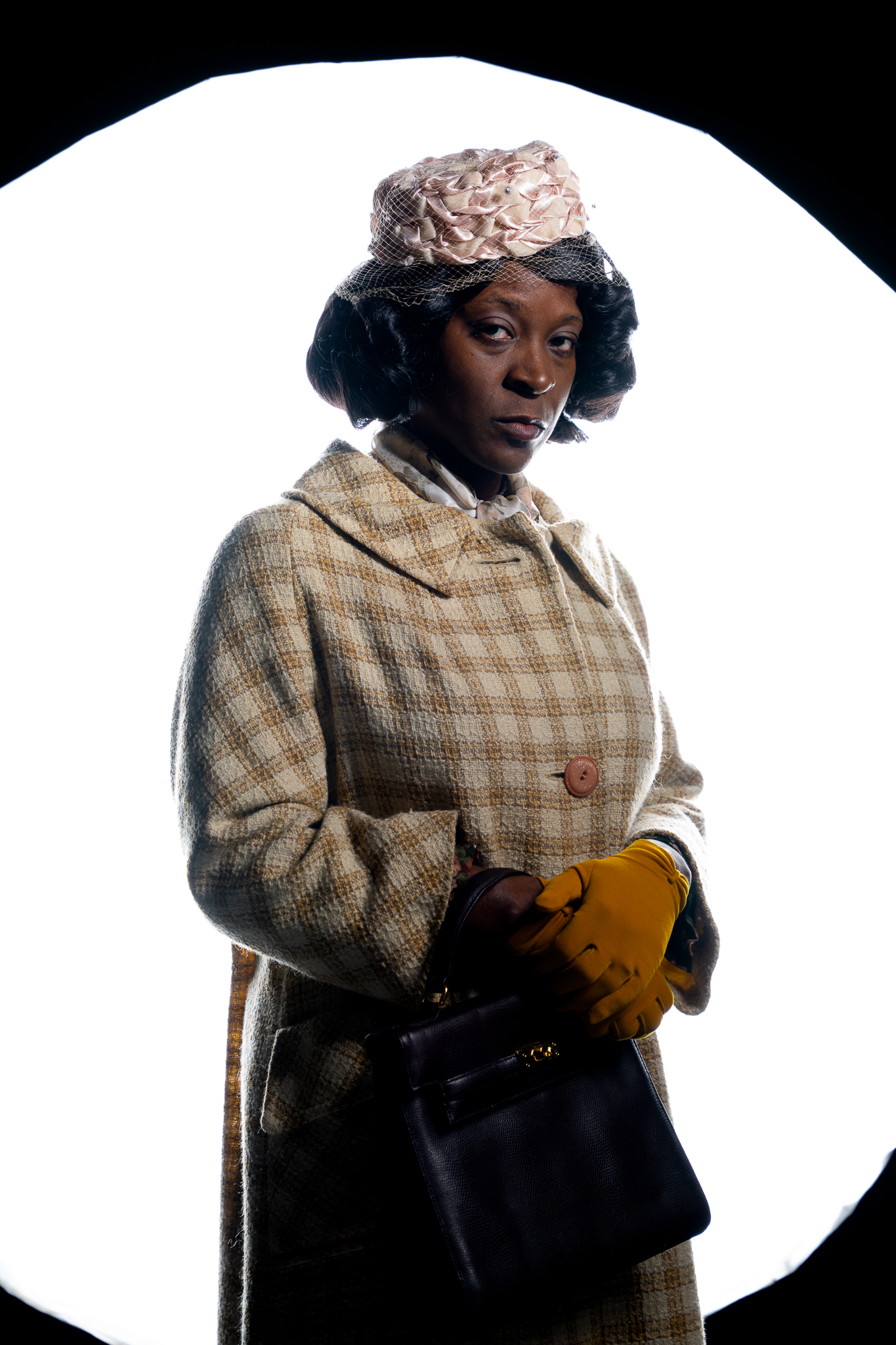The Pulitzer Prize Winning Play is at ICTC this Fall!
by Ann Marie Cusella

Photo courtesy of Mark Duggan/Nickel City Headshots
Have No Doubt
A brilliant production of Doubt, A Parable, the Pulitzer Prize-winning play by John Patrick Shanley, opened on Curtain Up! night at ICTC. Directed with precision by Victoria Pérez, the cast of four each give outstanding performances in this taut 95-minute drama.
Doubt posits the question, “Can we ever be sure?” For centuries scientists were sure the sun orbited the earth. Now we are sure of the opposite. Will scientists in 500 years determine something new about the sun and earth that is inconceivable to us? And will that be true? When it comes to human endeavors, can we ever really be sure of anything? And what do we do when we are not sure, or when we think we are sure but have no tangible reason for it?

Photo courtesy of Mark Duggan/Nickel City Headshots
A Shining Production
The year is 1964. Sister Aloysius is Principal at St. Nicholas elementary school in the Bronx, and she is sure that the popular Father Flynn is molesting their first and only Negro student, Donald Muller. But is he? Now, we would most likely assume he is given all the scandals in the past 20 years across the country and the globe about predatory priests. But 1964 was a very different time in the Catholic church and the United States. JFK had been killed. The Vietnam War was heating up. The Civil Rights movement was changing the consciousness of America, and Pope John XXIII had begun the process of moving the church out of the Middle Ages into the 20th Century. But the patriarchal structure of the church was intact. Priests held the power, and nuns were to be obedient to them. For Sister Aloysius to question the morals of a priest was tantamount to heresy, and she could be severely punished or even excommunicated for it.
While Father Flynn embraces the new openness of the church, Sister Aloysius is old school. He says they should show they are no different than the lay people in the parish. She responds, “But we are different”, and are held to a higher standard than the pleasure-seeking laity. However, she later questions whether it is alright to take a “step away from God” in service of a greater good. May one lie to expose the truth? In a powerful scene near the end of the play, the struggle between them speaks to the moral ambiguity that has plagued philosophers, sages, and lesser beings for millennia.
Josie DiVincenzo gives a bravura performance as Sister Aloysius. Her demeanor brooks no frivolity of any kind. Her movements are pinched, as if she were holding on very tightly to her principles in a changing world. She delivers her lines in a clipped speech pattern that is in keeping with her rigid beliefs. She can be hilarious when she spits out lines like, “Satisfaction is a vice”, without a change in her manner. In her defense of Donald to Father Flynn, she never wavers from that same demeanor and speech pattern. Her passion roils beneath the surface yet is clearly felt by the audience. She is terrific.
Steve Copps as Father Flynn exhibits all the charm of the good-looking, well-liked parish priest, who coaches the basketball team in addition to his religious work. He has a strong presence, is affable, and clearly shows his excitement about the possibilities in the more open church. Beneath all that affability Mr. Copps expresses the iron will of a man who knows his power and does not hesitate to use it. He holds the high cards in the game he plays with Sister Aloysius and is more than willing to take advantage of them. But when he does waver, he allows his fears to be laid bare for all to see.
Solange Gosselin is Sister James, a young nun who embraces kindness and having fun with her students, qualities that are anathema to Sister Aloysius, as are the frivolous art and music classes the younger nun has begun. Sister James is naive, easily swayed, unsure of herself. Ms. Gosselin conveys that innocent, insecure quality in all her scenes, and is the perfect foil for Father Flynn’s manipulations.
Davida Evette Tolbert has one powerful scene as Mrs. Muller, Donald’s mother. Her confrontation with Sister Aloysius shows her to be just as formidable a presence. Her impassioned defense of her son brings to light concepts that are new and confusing to Sister Aloysius. She has a mother’s strength, and a Black woman’s knowledge of how the world works for her beloved son and expresses all of it in no uncertain terms.
A Show Not to be Missed
Everything about this production shines. Each element, from the set by Sheila M. Lopez, to sound by Tom Makar (loved the crows), to lighting by Jayson Clark, to costumes by Lise Harty, is in keeping with the outward simplicity of the play. There is no fat, no bells and whistles that would take away from the drama unfolding. Director Victoria Pérez has assembled a cast and crew that are perfect for this short, brilliant play. Kudos to everyone involved.
A parable is a short and simple story that teaches a religious or moral lesson. Doubt is short, but there is nothing simple about the moral questions it raises. When you leave the theater, and I hope you do go see this play, you might ask yourself the question, “What do you do when you’re not sure?”
Doubt, A Parable is at Irish Classical Theatre Company through October 2nd.
Dates, Tickets and More Information
Doubt, A Parable is playing at the Irish Classical Theatre Company from September 16 – October 9, 2022.
0 Comments